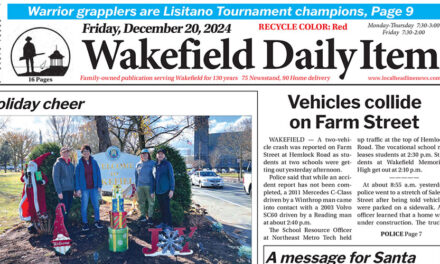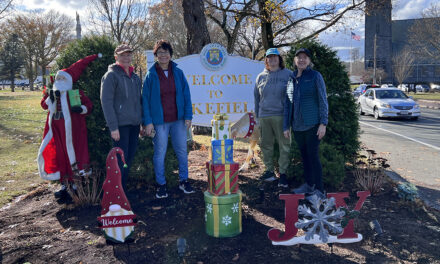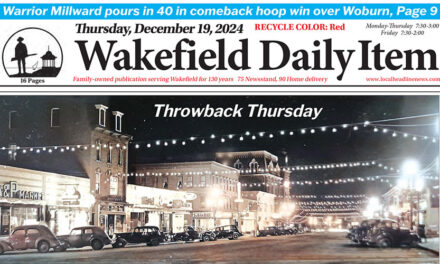Published in the May 8, 2017 edition.
By MARK SARDELLA
WAKEFIELD – Town Meeting didn’t say “yes” to a ban on plastic bags last Thursday, but it didn’t say “no” either. Instead, Town Meeting referred the matter to the Board of Selectmen for more study.
Article 28 on the Town Meeting warrant was a citizens’ petition to ban so called thin-film plastic bags typically provided at grocery and other retail stores for customer purchases.
Caitlin Bracken, a 15-year-old Pleasant St. resident who attends the Winsor School in Boston, initiated the proposed plastic bag ban. After Town Administrator Stephen P. Maio read the motion for Article 28, Bracken made a presentation to Town Meeting in support of banning plastic bags.
“In my ideal world, all plastic would be banned,” Bracken said. She said that the ban proposed under Article 28 would target the thinnest plastic bags, which she said were the most harmful.
She cited a study that claimed that the oceans would be without fish by 2048 due to plastics. She said that other marine animals like sea turtles are also negatively affected as are some land animals. Plastic bags also contribute to global warming, she said.
She noted that 20 states and 24 towns in Massachusetts currently have plastic bag bans. She said that the more towns that ban them, the greater the likelihood that a statewide bag ban would be instituted.
She also talked about the impact of plastic bags on litter in inland waterways and streams.
According to the text of the article, “Thin-film single-use plastic bags shall not be distributed, used, or sold for checkout or other purposes at any retail or grocery store within the Town of Wakefield.”
The text of Article 28 summarizes its intent.
“The purpose of this bylaw is to limit the amount of greenhouse gas emissions, preserve the oceans, protect wildlife, and reduce the amount of trash that ends up on the streets and in landfills by using recyclable, reusable, or compostable bags instead of thin-film single-use plastic checkout bags.”
The bylaw would impose an escalating schedule of fines on merchants for violations, from a warning to a $50 fine.
Chamber of Commerce Executive Director Marianne Cohen told Town Meeting that the Wakefield business community opposed a ban on plastic bags.
“The Officers and Board of Directors of the Wakefield-Lynnfield Chamber of Commerce are opposed to Article 28 on the Town Meeting Warrant, as it is written, which will ban the use of thin film plastic bags,” Cohen said.
“The Wakefield Lynnfield Chamber of Commerce merchant members, as well as other business owners, have indicated that they would like to be a part of the discussion involving any proposed ban on plastic bags in the future.
“While the Chamber appreciates the thought behind the article, the Directors and members also understand the financial burden such a ban would have on the membership, particularly small local business, as well as the challenges of properly packaging items that customer purchase to keep them safe and dry after leaving their shops,” Cohen said.
Rada Frohlichstein, who lives on Rochelle Drive and owns Rada Boutique in the downtown, said that a plastic bag ban would impose a financial burden on local small businesses like hers. She added that she was never asked for her opinion of the proposed ban.
She said that people tend to think that small business owners have plenty of money. But she said that the ban would force her to switch to either paper bags with handles at a cost of $2.50 per bag or the more costly, thicker plastic bags, which would be exempt under the ban. In either case she would have to order a minimum of 1,000 bags, she said.
Pat Golini of Bennett Street said that he supported the bag ban. He said that incinerating plastic bags that go into Wakefield’s trash are harmful to health.
Christine DeFelice of Lawrence Street said that she opposed the ban, saying that it would hurt business.
“People will go elsewhere,” she said. “I’ll go to CVS in Stoneham or Saugus.” She added that people were the cause of litter, not plastic bags.
Dan Sherman of High Street asked Town Counsel Thomas Mullen if the proposed bylaw had been reviewed by the state. Mullen said that similar bylaws in other towns had been approved by the Attorney General’s office.
Heather Marino of Holland Road maintained that the proposed ban wouldn’t work and questioned how it could be enforced.
Several other speakers said that they agreed with the proposed ban, citing plastic bags that end up in the Lake as well as other environmental concerns.
As a way to protect small businesses, an amendment was proposed to exempt businesses under 3,000 square feet. But Sherman questioned the effectiveness of the ban in that case, noting that most downtown businesses are under the limit and would collectively still generate a lot of plastic.
DeFelice also urged defeat of the amendment, saying that it discriminated against larger businesses. “They are taxpayers too,” she pointed out.
When the amendment was put to a vote it was defeated.
Elizabeth Lowry of Green Street suggested that it was “silly, selfish and very juvenile” to resist the ban.
Finally, in response to a question from Laurie Hunt of Terrace Court, Mullen said that one option would be for Town Meeting to refer the matter to the Board of Selectmen for further study.
Hunt made a motion to that effect, which narrowly passed by three votes, 64-61.
—–
In other business Thursday night, Town Meeting:
• Approved under Article 9 the transfer of $20,000 from Free Cash for the indemnification of police officers and firefighters for injuries in the line of duty.
• Appropriated from Free Cash $165,000 to supplement the Fire Department budget for the current year under Article 10.
• Appropriated from tax levy under Article 11 $180,000 to upgrade the radio system used by police and firefighters.
• Under Article 13, approved a routine article giving the town the right to use eminent domain procedures when necessary to maintain the town’s drainage, water and sewer infrastructure.
• Approved Article 14, to raise and appropriate $1,699,705 the collection and disposal of refuse and recycling. There was no discussion on Article 14.
• Approved under Article 15 $100,000 to implement the federally mandated National Pollution Discharge and Elimination System (NODES).
• Under Article 16, voted $200,000 to supplement state Chapter 90 funding for roadway maintenance. An amendment to increase the amount to $500,000 was defeated.
• Voted $50,000 for new sidewalks under Article 17.
• Unanimously approved with no discussion borrowing $855,000 to make repairs to the drainage system on New Salem Street under Article 18.
• Approved under Article 19 $100,000 for the purchase and installation of flow gauge meters for the town drainage system.
• Unanimously approved under Article 20 $1,017,000 in a grant/loan from the MWRA to fund the town’s sewer inflow/infiltration removal program.
• Approved under Article 21 $971,160 from the Sewer Surplus Reserve account for the upgrade of two sewer pumping stations.
• Under Article 22, voted to transfer $165,000 from the Water Surplus Reserve account for the replacement of water mains at various locations around town.
• Approved under Article 23 the transfer of $160,000 from the Water Surplus Reserve account for upgrades to the Broadway Water Treatment Plant.
• Under Article 29, approved a citizen petition to amend the Zoning Bylaws to allow detached art/craft studios in residential neighborhoods with a Special Permit.
• Under Article 24, approved $75,000 from the Water Surplus Reserve account for maintenance of the town’s water pressure tank on Sydney Street.




